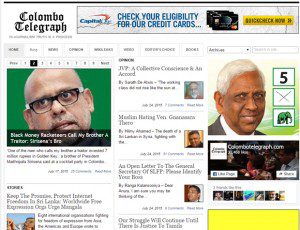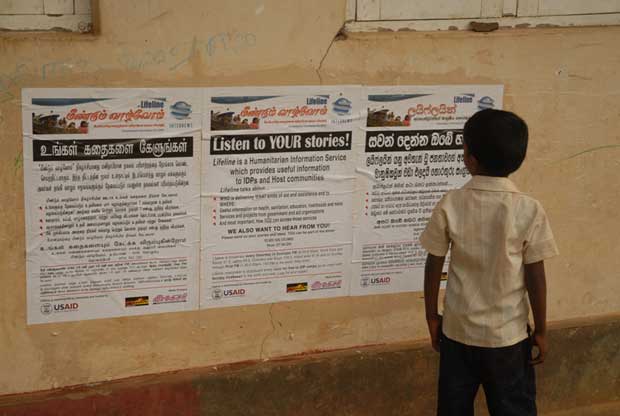24 Jul 2015 | mobile, News and features, Sri Lanka
 The Colombo Telegraph, Sri Lanka’s most iconoclastic investigative news website, is gearing up for this year’s second national election. And once again they face the threat of censorship — despite a presidential promise to bring it to an end.
The Colombo Telegraph, Sri Lanka’s most iconoclastic investigative news website, is gearing up for this year’s second national election. And once again they face the threat of censorship — despite a presidential promise to bring it to an end.
January’s polls saw the website blocked to domestic voters by order of authoritarian incumbent president Mahinda Rajapaksa. Unseated by shock winner Maithripala Sirisena, one of the victor’s first acts after the vote was to lift the official banning order.
Unfortunately his officials didn’t get the memo and simply resorted to more subtle and illegal censorship. Their covert interference was exposed by the Colombo Telegraph just a month later, drawing a personal apology from the minister responsible, Mangala Samaraweera, and a promise of a full investigation.
That promised investigation has so far come to nothing, while the later announcement of a general election for August 18 has raised political tensions. This week eight international freedom of expression groups, including Index on Censorship, wrote to Samaraweera reminding him of his promise.
“The media must be free to cover the upcoming campaigns without fear of interference, covert or overt, online or off,” said the groups. Censorship, legal or illegal, may fall hard on independent voices like the Colombo Telegraph unless the state’s secret censors are found and stopped.
Colombo Telegraph editor Uvindu Kurukulasuriya is calling on the government to complete the inquiry as soon as possible and guarantee that the media will be free to report the campaign.
But the Colombo Telegraph has few friends among the current government, led by United National Party prime minister Ranil Wickremesinghe.
The government has been embarrassed by the site’s publication of parts of a leaked 19-page draft parliamentary committee report into an alleged government bond scam linked to Central Bank Governor Arjuna Mahendran and his son-in-law. The dissolution of parliament would have buried its detailed allegations had it not been leaked.
Wickremesinghe said the draft report was ‘false and perverted’ and has no official status. This did not stop him threatening media that cite it with prosecution under an act prohibiting sharing details of committee proceedings before they are presented to parliament itself. The use of the act – much criticised by independent media who have called for its repeal – is designed to deter other journalists following up the story during the election campaign.
Media rights are suddenly looking shaky across the country. Despite pledging to introduce a Right to Information Act as a key part of the Sirisena-Wickremesinghe government’s first 100 days in power, they failed to deliver. And the ruling party set the tone for the election campaign by reportedly pressing state media to downplay coverage of the start of Rajapakse’s bid to return to power as prime minister.
Meanwhile the threat of more illegal online censorship remains as long as the original crime remains un-investigated. It took a careful study by the site’s technical advisers in Denmark to discover that what appeared to be poor connections to some of the site’s more controversial news pages, was in fact targeted interference.
The source of the interference was traced to a server in the central office of Sri Lanka Telecom at the OTS Building in Lotus Road in Colombo.
Websites can be “prohibited or be subject to supervision and control” under section 69 of the Sri Lanka Telecommunications Act 1991 – but only under ministerial authority, and under a publicly announced order. No such order was made to replace the one lifted by Sirisena.
Kurukulasuriya’s online news site, run by volunteers for four years, has developed a strong record of controversial scoops backed with an impressive array of documentation.
“We’ve never supported any particular political party, organisation or individual over another, and have proven it over the years. We just want our site to continue as an independent media organisation without unnecessary legal interference or illegal censorship.”
26 Jan 2015 | News and features, Politics and Society, Sri Lanka

Any nation’s media would be hard pressed keeping track of a landslide of political change, environmental crises, imminent constitutional reform and a general election, all while keeping safe from a generation of assassins used to impunity.
When the media itself needs reform too, the problems might seem overwhelming. This is why Sri Lanka needs a constitutionally recognised national commission to oversee that reform and ensure freedom of expression is properly defended.
Maithripala Sirisena’s unexpected and virtually peaceful election win over incumbent President Mahinda Rajapaksa was quickly painted as a game changer for the country’s media.
He and new Prime Minister Ranil Wickremesinghe began well by lifting blocks on independent news websites banned by the old regime. Exiled journalists were urged to return. Sirisena also promised to use his new authority to investigate the 2009 murder of combative political journalist Lasantha Wickrematunge, whose killers are still free.
But the early offers soon began to look token. There was no matching commitment to identify the killers of cartoonist Prageeth Eknelygoda, who went missing five years ago, or the men behind the notorious “white van” abductions of peaceful activists. In fact Sirisena’s commitment to media freedom looks somewhat qualified.
A series of special expert commissions will be established to oversee an independent review of the judiciary, police, public services, elections, human rights and anti-corruption measures, written into authority by a 19th amendment to the constitution. Pointedly perhaps, the list does not include a commission on the media.
Plans for an independent media commission are not new, and were excluded from what was eventually enacted as the 17th amendment to Sri Lanka’s Constitution in 2001. Media rights groups should steel themselves for a fight to ensure that the much-needed body is not excluded again.
Uvindu Kurukulasuriya, editor of the once banned Colombo Telegraph, thinks it unfortunate that the new government will not establish a media commission, but thinks it was deliberate. “They are not willing to transform state media into (independent) public service broadcasters, and they don’t want to broad-base (collectivise) the state owned Lake House newspaper group.”
The journalist and legal scholar Asanga Welikala calls for the founding of an independent media commission on the recommendation of the constitutional council and representing working journalists, academics, proprietors and new media.
“The commission once constituted would have overall oversight of public service media and would be answerable to parliament,” he argued for the online political journal Groundviews. “Its primary role would be to oversee the public service media institutions, but may include other powers and functions, including the regulation of the (new and traditional) media marketplace, and to promote the freedom of expression in all its forms including through new technology.”
Kurukulasuriya urges action to break the grip of the political appointees heading the country’s major public and private media companies. The co-option of the owners was the subtler side of the old regime’s system of media control, he says. “The previous Rajapaksa regime changed the ownerships of several media institutions through intimidation.”
Self-censorship drove the majority; more deadly means of censorship were reserved for the small cadres of independent journalists who could not be bought or fired, says Kurukulasuriya. Will the government go on reading “media freedom” as owners’ rights, not journalists’ rights?
Reforming the Sri Lankan media is a vast task. The counter-intuitively named Independent Television Network needs privatisation and the nominally public Sri Lanka Broadcasting Corporation (SLBC), and the Sri Lanka Rupavahini Corporation (SLRC), need a proper public service broadcast mandate and an end to political interference. A constitutionally mandated media commission could appoint and “audit” the works of a new independent broadcasting authority founded to oversee their works.
There is justice still to be found too. According to the Committee to Protect Journalists (CPJ), Sri Lanka has the fourth worst record on its 2014 Impunity Index, which spotlights countries where journalists are murdered and the killers remain free.
In an open letter to Rajapaksa on the eve of elections, Wickrematunge’s widow Sonali Samarasinghe wrote: “At no time in the history of our country has the freedom of expression so brutally been repressed as it is now. Such media as do operate in the country, have been transformed either into propaganda mouthpieces for you and your brothers, or bullied into submission.”
The state media’s job is to “reflect the line of whatever government is in power,” admitted Rajpal Abeynayake, the editor of the state-run Daily News in a memorable post-election quote to The Guardian’s Amantha Perera. “If the government changes, so does the newspaper. It’s as simple as that. If they want to change that practice they could, but so far no government has done it.”
That Sirisena is showing little inclination to substantively change matters. Bandula Padmakumara — the chairman of the Lake House newspaper group, morning news show anchor and well documented supporter of the Rajapakse family — went just a few hours after the election results came in. But few others have followed.
The new president may have to rely on established partners in self-censorship to help shore up his “fragile, sprawling and diverse” coalition, as the New York Times described it. With parliamentary elections set for late April under Sirisena’s 100 day schedule, the campaign may see old favours be called in and the media expected to help paper over the coalition’s cracks.
Without greater independence the Sri Lankan media will not be able to fairly and accurately report the campaign. International and regional media rights groups need to heap pressure of their own on Sirisena’s new media ministry secretary, Karunarathna Paranawithana, who describes himself on his Facebook page as a “diplomat, journalist (and) political activist”.
The appointment of a constitutionally recognised commission for the media next month would not do much to change the situation in time for the election, but it would send a clear message to embattled journalists that change was on the agenda and risks were worth taking.
According to Sirisena’s own strict timetable, his administration will establish the independent commissions on Wednesday 18 February. There’s still time to add one on media to the list.
This article was posted on 26 January 2015 at indexoncensorship.org
 The Colombo Telegraph, Sri Lanka’s most iconoclastic investigative news website, is gearing up for this year’s second national election. And once again they face the threat of censorship — despite a presidential promise to bring it to an end.
The Colombo Telegraph, Sri Lanka’s most iconoclastic investigative news website, is gearing up for this year’s second national election. And once again they face the threat of censorship — despite a presidential promise to bring it to an end.


